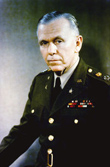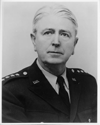Marshall’s Failure
 Other than give lip service to the issue, little effort had been made up to this time by the American political establishment to assist the Chinese in resolving their internal political problems. After the war, President Truman determined to make an effort. He dispatched General Marshall December 20, 1945 to China, (the war ended in August 1945) as a Special Envoy for the purpose of arranging a settlement of the dispute between the Chinese Communists and the Nationalists. The announcement generated great interest among the Nationalists as well as the American Embassy. Wedemeyer had at this time been in his new assignment in China fourteen months and had learned a good deal about the problems of working in China and the enormous difficulty of trying to reconcile the differences between the Communists and the Nationalists. He was looking forward to seeing and working with his old friend General Marshall and lending him any assistance in his endeavor but was realistic in the knowledge of the difficulties facing Marshall.
Other than give lip service to the issue, little effort had been made up to this time by the American political establishment to assist the Chinese in resolving their internal political problems. After the war, President Truman determined to make an effort. He dispatched General Marshall December 20, 1945 to China, (the war ended in August 1945) as a Special Envoy for the purpose of arranging a settlement of the dispute between the Chinese Communists and the Nationalists. The announcement generated great interest among the Nationalists as well as the American Embassy. Wedemeyer had at this time been in his new assignment in China fourteen months and had learned a good deal about the problems of working in China and the enormous difficulty of trying to reconcile the differences between the Communists and the Nationalists. He was looking forward to seeing and working with his old friend General Marshall and lending him any assistance in his endeavor but was realistic in the knowledge of the difficulties facing Marshall.
Wedemeyer met Marshall at the famed Cathay Hotel in Shanghai when he arrived. Marshall had explicit instructions from President Truman to broker a deal between the Nationalists and the Communists. He had no idea how difficult, nay, impossible his mission was. But even if he did he would not have been deterred in the least. Marshall was not a man accustomed to failure, and he did not expect failure in this effort. The great man was not used to failure, and like the President and most American political leaders thought it was simply a question of debate, compromise, and good will, somewhat like labor negations between management and the unions. Marshall arrived in China tired from his wartime duties. He made little preparation for the negotiations. Incredibly, when he was to be briefed on the situation in China prior to his departure he insisted that the entire issue be reduced to a writing on a single page. This was Marshall’s wartime directive, and it might have had some utility for wartime, but to think that the titanic struggle in China could be reduced to a single page was ludicrous.
Copyright © 2007 - 2026. All Rights Reserved.
Original Coding by Goimage Media Services

